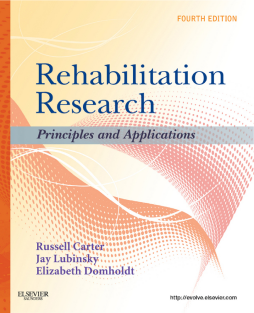
Additional Information
Book Details
Abstract
Covering the full range of rehabilitation research with a clear, easy-to-understand approach, this resource will help you analyze and apply research to practice. Rehabilitation Research: Principles and Applications examines traditional experimental designs as well as nonexperimental and emerging approaches, including qualitative research, single-system design, outcomes research, and survey research. Clinical case studies and references will enhance your skills as a scientist-practitioner. Written by noted educators Russell Carter and Jay Lubinsky, this book emphasizes evidence-based practice within physical therapy, occupational therapy, and other rehabilitation professions.
- Discipline-specific examples are drawn from three major fields: physical therapy, occupational therapy, and speech-language pathology.
- Unique! Coverage of non-experimental research includes chapters on clinical case reports and qualitative research, so you can understand a wide range of research methods and when it is most appropriate to use each type.
- Expanded Single-Subject Design chapter provides a more thorough explanation and examples of multiple baselines, alternating treatments, and interactions -- designs that can be use in everyday clinical practice.
- Finding Research Literature chapter includes step-by-step descriptions of literature searches within different rehab professions.
- Student resources on a companion Evolve website allow you to review important concepts with exercises and discussion questions, research article analyses, and a downloadable spreadsheet.
- Unique! New Evidence-Based Practice chapter provides an overview of the important concepts of EBP and the WHO model of health and disease.
- Discussion questions on the companion Evolve website provide you with ideas for further study.
- Unique! Research article analyses on Evolve provide more in-depth analysis and demonstrate the writing style you should employ.
- New authors Russell Carter and Jay Lubinsky bring an interdisciplinary focus and a stronger emphasis on evidence-based practice.
